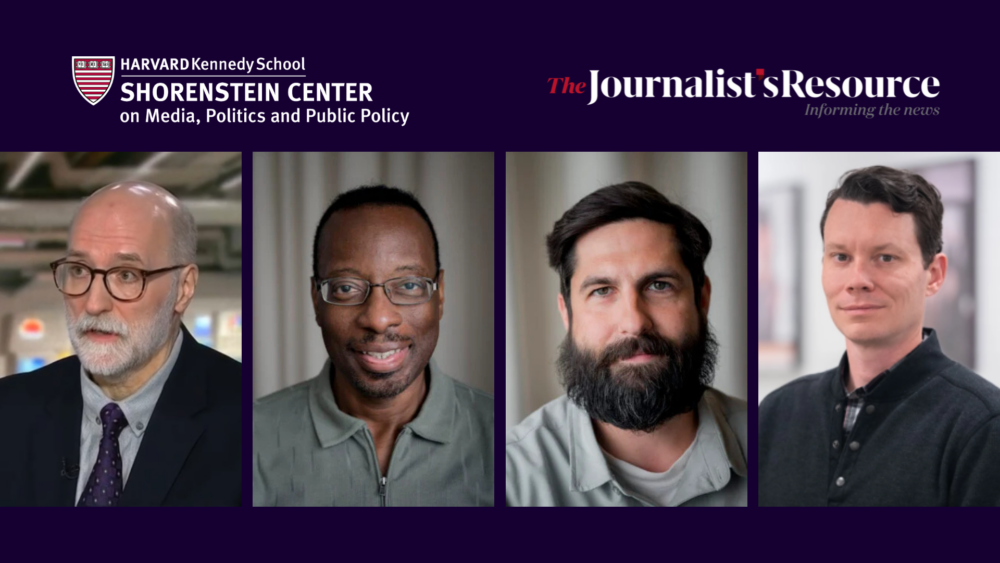
Product Management and Society Playbook
Reports & Papers
 Eric Pooley
Eric PooleyKalb Fellow, Shorenstein Center, Fall 2008
Contributor at Time Magazine
In How Much Would You Pay to Save the Planet? The American Press and the Economics of Climate Change, a discussion paper researched and written during the Shorenstein Center’s fall 2008 semester, Fellow Eric Pooley looked at coverage of the climate-change issue by the American press, focusing on the run-up to the vote on the Lieberman-Warner Climate Security Act.
Pooley concluded that the press misrepresented the economic debate over carbon cap and trade, failed to perform the basic service of making climate policy and its economic impact understandable to the reader, and allowed opponents of climate action to set the terms of the cost debate. He also concluded that editors had failed to devote sufficient resources to the climate story, shoving it into the “environment” pigeonhole.
The paper, published in January 2009, prompted a response from Washington Post energy reporter Steven Mufson, one of the journalists whose work Pooley analyzed.
I would like to respond to some criticism in Eric Pooley’s generally stimulating discussion paper about press coverage of the economics of climate change. Mr. Pooley criticizes me for failing to take issue with a National Association of Manufacturers study in an article published in the Washington Post‘s Outlook section. As Mr. Pooley notes, I mentioned NAM and quoted its president, John Engler, in one paragraph near the beginning of the piece. I did that because NAM, regardless of the merits or deficiencies of its economic analysis, is an important player in the debate over climate legislation and warranted brief mention. I did not dissect its economic analysis because I chose to make other points about the debate over the economics of climate change and how it is framed.
Mr. Pooley would rather I wrote a different article, one that scrutinized the NAM study, and I respect that. (He does an interesting job of examining the NAM study that in this discussion paper.)
But I take issue when he asserts that I “withheld information” that readers could have used to judge who is right or wrong in the climate economics debate. He suggests that I did that because of concern about “source preservation.” This is not the case. I do not believe in withholding information to preserve sources, unless those sources’ lives are in danger. Pulling punches, as Mr. Pooley puts it, only diminishes a reporter’s integrity, even in the eyes of those who might benefit from some omission.
In an e-mail exchange after his paper was posted, Mr. Pooley sent me an excerpted transcript of our conversation including a comment he quotes in his paper: “I didn’t want to come down too heavily because I’m going to keep covering this subject and I want everyone to keep talking to me.”
I want to point out two things about this comment. First, there is a difference between not wanting to “come down too heavily” on someone and withholding important information from readers. Second, I was referring to the tone of the article, not its substance. To put it in context, my comment came shortly after Mr. Pooley posed this question: “But you passed up the opportunity to hit NAM on a bogus report, just omitted that.” I do not regard articles as opportunities to “hit” anyone. I have tried to earn my sources’ respect by treating people fairly and respectfully, even when pointing out their shortcomings, contradictions or financial interests.
I hope readers will judge for themselves by reading the article in question: “Is This Green Enough? We Can Clean Up Our Act, But It’ll Cost Us.”
Finally, Mr. Pooley bases his paper on articles that were published between December 2007 and June 2008. The Washington Post has published several important pieces that deal with the economics of climate change and legislation. They include:
Steven Mufson
January 26, 2009
If my paper has any takeaway for a talented reporter such as Steven Mufson, I would hope it is this: In an article that presents economic arguments for and against climate legislation, it simply isn’t good enough to serve up those arguments without exploring whether they hold water. This doesn’t mean that I wish he had written “a different article.” It means that, in my opinion, the otherwise strong article he did write was flawed by a grave omission, one that could have been rectified with just a sentence or two of factual analysis.
The question is why he left it out. When I interviewed Mr. Mufson, I hoped to find out whether he agreed that the argument National Association of Manufacturers president John Engler made in the story was based on a problematic study, and, if so, why he had not seen fit to share that with his readers. Mr. Mufson made it clear that he did agree with me, so I asked him — three times — why he omitted it. Here is our full exchange:
Pooley: You quoted [NAM president John] Engler but didn’t dive into the report — because you thought it was bogus?
Mufson: The report did have a lot of problems, but it was also space constraints and how much the average reader wanted to absorb. There was a lot of stuff I would have liked to have stuck in there; there just wasn’t enough space.
Pooley: But you passed up the opportunity to hit NAM on a bogus report, just omitted that. And if I lay those two reports next to each other—
Mufson: They’re not equal. And that’s why I dwelled more on the [EDF] one.
Pooley: You played Engler off EDF as the two sides of the cost debate but you didn’t draw a conclusion about which side might be right.
Mufson: I didn’t want to come down too heavily because I’m going to keep covering this subject and I want everyone to keep talking to me.
Readers can judge for themselves whether my words — “source preservation” — are an accurate paraphrase of what Mr. Mufson said. I take him at his word that this is not what he meant to say, and applaud him for treating his sources with respect. I certainly wasn’t calling for disrespectful treatment of anyone. When I asked him why he had not “hit” — or called out — NAM on its study, I was asking about substance, not tone: probing his failure to disclose a source’s crucial shortcoming. Mr. Mufson does not think the omission matters, and on that we must disagree.
Eric Pooley
January 27, 2009


Videos

Commentary